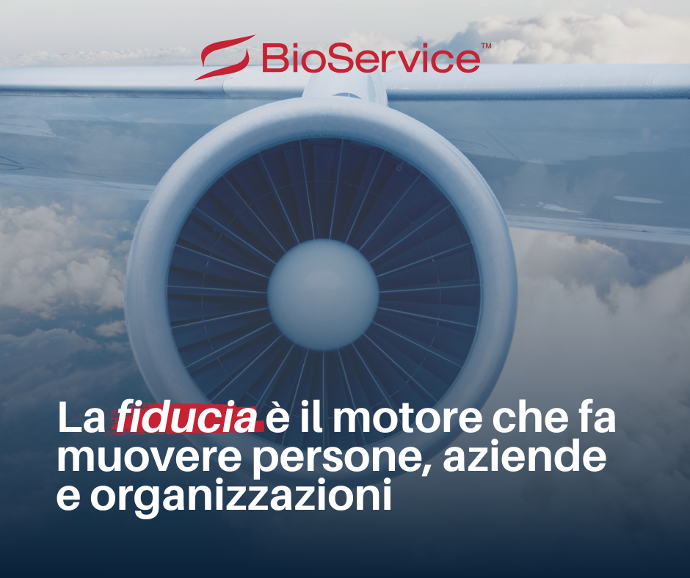Since 1987, BioService has been working daily to build trust with its stakeholders. Trust is an essential element that permeates every aspect of social, economic and personal life. But what does trust really mean and why is it so crucial to strengthen this bond with your customers?
Summary
What is trust?
Trust originates from the Latin word fides, which literally means “recognition of another's trustworthiness.”
So let us stop for a moment on the importance of this definition. The term emphasizes that trust is not an instinctive act, but something that must be earned through concrete actions such as encounter and contact. Unlike faith, which represents an absolute act, trust requires a process of familiarization, exposure and sharing; it requires a progressive building in which we test the loyalty and trustworthiness of the other. Only after this process are we ready to give our trust.
Trust, then, is the belief in the safety, reliability and integrity of a person, organization or system. It makes human interactions and activities at all levels of society easier.
When trust exists, people are more willing to cooperate, invest and make quick decisions, thus contributing to growth, development and overall well-being.
However, trust is fragile and can be easily eroded by dishonest behavior or violations; therefore, it is important to preserve and promote it at all levels.
So let us stop for a moment on the importance of this definition. The term emphasizes that trust is not an instinctive act, but something that must be earned through concrete actions such as encounter and contact. Unlike faith, which represents an absolute act, trust requires a process of familiarization, exposure and sharing; it requires a progressive building in which we test the loyalty and trustworthiness of the other. Only after this process are we ready to give our trust.
Trust, then, is the belief in the safety, reliability and integrity of a person, organization or system. It makes human interactions and activities at all levels of society easier.
When trust exists, people are more willing to cooperate, invest and make quick decisions, thus contributing to growth, development and overall well-being.
However, trust is fragile and can be easily eroded by dishonest behavior or violations; therefore, it is important to preserve and promote it at all levels.

What types of trust exist?
- Trust in interpersonal relationships
- Trust in processes
- Self-confidence
Trust as an "engine" of the company
Trust is a crucial element that affects the speed and efficiency with which transactions, relationships and activities of all kinds can take place. The world moves at the “speed of trust.” Here is how trust impacts different aspects of society.
- Economic efficiency: in business settings, trust facilitates business transactions. When people and businesses trust each other, they are more likely to engage in business arrangements without requiring excessive checks and balances. This speeds up the exchange process and promotes economic growth.
- Interpersonal relationships: in personal and professional relationships, trust is critical for cooperation and collaboration. When people trust each other, they are more open to sharing information, resources and expertise, leading to faster and more effective solutions to problems.
- Innovation: trust promotes innovation and progress. When people trust, they are more likely to take risks, invest in new ideas, and work together to tackle complex challenges.

How much does trust cost?
Trust has no direct monetary cost, but its economic implications can be significant. Lack of trust can, in fact, lead to high costs, such as:
- transaction costs. Without trust, additional audits, complex legal agreements or financial guarantees are required to protect against potential fraud or default. These costs increase the overall expenses of doing business;
- risk management costs. Businesses and individuals must allocate resources to manage the risk from lack of trust. This may include insurance, additional security measures, or diversification strategies;
- reputational costs. Loss of trust can severely damage a company's reputation, resulting in the loss of customers, business partners and investors. Restoring trust requires considerable time and resources.
What involves the loss of trust?
Loss of trust can have significant consequences at the individual, relational, organizational and societal levels. Let's look at them in more detail.
- Relationship breakdown: at the interpersonal level, loss of trust can lead to relationship breakdown, causing separation, divorce and conflict.
- Decline in cooperation: without trust, cooperation and collaboration decline, decreasing the efficiency and effectiveness of shared activities.
- Decline in performance: lack of trust can demotivate people, reducing productivity and hindering progress.
- Reduced investment: in business, loss of trust can reduce investment, slowing growth and development.
- Damage to reputation: loss of trust can damage organizations' reputation, making it difficult to attract new customers and business partners.
- Increased costs: as seen in the previous section, loss of trust often leads to increased operating costs, as additional measures are required to mitigate risks.

In conclusion
Trust is critical to individual and collective well-being. Building and maintaining trust takes time, commitment and integrity.
The importance of this bond can be closely observed, for example, in the relationship between a dentist and his patient. A person chooses a particular dentist because of his credibility, and over time, by getting to know the doctor and personally testing his skills, the patient develops a growing trust in him. The dentist must continue to cultivate this trust through professionalism, dedication and constant commitment, avoiding taking the patient's consideration for granted lest he or she risk losing it.
Likewise, BioService strives every day to earn and maintain the trust of its clients. Just like the dentist who must do his or her job to the best of his or her ability, with passion and dedication, we are dedicated to offering high-quality products and providing excellent service.
Trust not only accelerates progress, but also creates an environment in which people can thrive and innovate. For this reason, trust remains at the core of every action and decision we make.
The importance of this bond can be closely observed, for example, in the relationship between a dentist and his patient. A person chooses a particular dentist because of his credibility, and over time, by getting to know the doctor and personally testing his skills, the patient develops a growing trust in him. The dentist must continue to cultivate this trust through professionalism, dedication and constant commitment, avoiding taking the patient's consideration for granted lest he or she risk losing it.
Likewise, BioService strives every day to earn and maintain the trust of its clients. Just like the dentist who must do his or her job to the best of his or her ability, with passion and dedication, we are dedicated to offering high-quality products and providing excellent service.
Trust not only accelerates progress, but also creates an environment in which people can thrive and innovate. For this reason, trust remains at the core of every action and decision we make.

